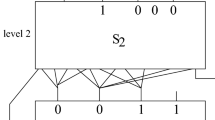Abstract
For any reduction r, a set is called “≤ pr -sparse” if it is ≤ pr -reducible to a sparse set. The difficulty of sets in nondeterministic complexity classes is investigated in terms of non-≤ p1−tt -sparseness, i.e., not being ≤ p1−tt -reducible to any sparse set. In particular, nondeterministic complexity classes used to specify various types of one-way functions are mainly considered, i.e., UP, N(poly), UBPP, and UP. For each such class, we prove that it contains a non-≤ p1−tt -sparse set unless it is included in P. Since these classes are included in more general nondeterministic complexity classes such as NP, easy consequences of our observations show the nonsparseness of ≤ p1−tt -hard sets for such classes.
(extended abstract)
This research was supported in part by the National Science Foundation under Grants CCR-8611980
Address as of August 1988: Dept. of Computer Science, Tokyo Institute of Technology, Tokyo 152, JAPAN
Preview
Unable to display preview. Download preview PDF.
Similar content being viewed by others
References
L. Adleman, Two theorems on random polynomial time, in “Proc. 17th Ann. Sympos. on Foundations of Computer Science”, IEEE, New York (1978), 75–83.
E. Allender, “Invertible Functions”, Ph.D. Dissertation, Georgia Institute of Technology (1985).
E. Allender, The complexity of sparse sets in P, in “Proc. of 1st Structure in Complexity Theory Conference”, Lecture Notes in Computer Science 223, Springer-Verlag, Berlin (1986), 1–11.
L. Babai, Trading group theory for randomness, in “Proc. 17th ACM Sympos. on Theory of Computing”, ACM (1985), 421–429.
R. Book and K. Ko, On sets reducible to sparse sets, SIAM J. Comput. 17 (1988), to appear.
S. Even, A. Selman and Y. Yacobi, The complexity of promise problems with applications to public-key cryptography, Inform. and Control, 61 (1984), 159–173.
S. Fortune, A note on sparse complete sets, SIAM J. Comput. 8 (1979), 431–433.
M. Garey and D. Johnson, “Computers and Intractability, A Guide to the Theory of NP-Completeness”, Freeman, San Francisco (1979).
J. Grollman and A. Selman, Complexity measures for public-key cryptosystems, SIAM J. Comput. 11 (1988), to appear.
J. Hartmanis, “Feasible Computations and Provable Complexity Properties”, SIAM, Philadelphia (1978).
J. Hopcroft and J. Ullman, “Introduction to Automata Theory, Language, and Computation”, Addison-Wesley, Reading (1979).
D. Joseph and P. Young, Some remarks on witness functions for nonpolynomial and noncomplete sets in NP, Theoret. Comput. Sci. 39 (1985), 225–237.
K. Ko, T. Long and D. Du, On one-way functions and polynomial time isomorphisms, Theoret. Comput. Sci. 47 (1986), 263–276.
R. Ladner, N. Lynch and A. Selman, A comparison of polynomial time reducibilities, Theoret. Comput. Sci. 1 (1975), 103–123.
S. Mahaney, Sparse complete sets for NP: solution of a conjecture of Berman and Hartmanis, J. Comput. Syst. Sci. 25 (1982), 130–143.
S. Mahaney, Sparse and reducibility, in “Studies in Complexity Theory (R. Book ed.)”, Pitman, London (1986).
A. Meyer and M. Paterson, With what frequency are apparently intractable problems difficult?, Technical Report, Massachusetts Institute of Technology, Cambridge TM-126 (1979).
C. Papadimitriou and M. Yannakakis, The complexity of facets (and some facets of complexity), J. Comput. Syst. Sci. 28 (1984), 244–259.
R. Rivest, A. Shamir and L. Adleman, A method for obtaining digital signatures and public-key cryptosystems, Comm. ACM 21 (1978), 120–126.
U. Schöning, Complete sets and closeness to complexity classes, Math. Syst. Theory 19 (1986), 29–41.
A. Selman, Promise problems complete for complexity classes, Technical Report, Northeastern University, Boston NU-CCS-87-9 (1987).
A. Selman, Complexity issues in cryptography, in “Computational Complexity Theory (J. Hartmanis ed.)”, Proc. Sympos. in Applied Math., American Math. Society (1988), to appear.
E. Ukkonen, Two results on polynomial time Turing reductions to sparse sets, SIAM J. Comput. 12 (1983), 580–587.
L. Valiant, Relative complexity of checking and evaluating, Inform. Process. Lett. 5 (1) (1976), 20–23.
L. Valiant and V. Vazirani, NP is as easy as detecting unique solutions, Theoret. Comput. Sci. 47 (1986), 85–93.
O. Watanabe, On one-one polynomial time equiyalence relations, Theoret. Comput. Sci. 38 (1985), 157–165.
O. Watanabe, Polynomial time reducibility to a set of small density, in “Proc. 2nd Structure in Complexity Theory Conference”, IEEE, New York (1987), 138–146.
O. Watanabe, On the difficulty of one-way functions, Inform. Process. Lett., to appear.
Y. Yesha, On certain polynomial-time truth-table reductions to sparse sets, SIAM J. Comput. 12 (1983), 411–425.
Author information
Authors and Affiliations
Editor information
Rights and permissions
Copyright information
© 1988 Springer-Verlag Berlin Heidelberg
About this paper
Cite this paper
Watanabe, O. (1988). On ≤ p1−tt -sparseness and nondeterministic complexity classes. In: Lepistö, T., Salomaa, A. (eds) Automata, Languages and Programming. ICALP 1988. Lecture Notes in Computer Science, vol 317. Springer, Berlin, Heidelberg. https://doi.org/10.1007/3-540-19488-6_151
Download citation
DOI: https://doi.org/10.1007/3-540-19488-6_151
Published:
Publisher Name: Springer, Berlin, Heidelberg
Print ISBN: 978-3-540-19488-0
Online ISBN: 978-3-540-39291-0
eBook Packages: Springer Book Archive




